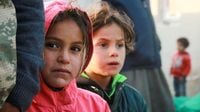The Russian Ministry of Education is preparing a draft order that will require migrant children to present a certificate confirming their absence of infectious diseases before enrolling in kindergartens. This measure aims to ensure that all children in these educational institutions are safe from potential health risks, as reported by the Bratsk Television Studio citing TASS.
According to the explanatory note accompanying the draft, these changes are designed to maintain epidemiological safety conditions for all pupils during their time in kindergartens. The new requirements will not only focus on health documentation but will also require migrant families to submit several important documents.
Migrants will need to provide copies of documents that prove their child's legal status in the Russian Federation, the child's SNILS (a unique identification number for individuals in Russia), and, if applicable, copies of documents related to the parents' employment activities. All documents must be in Russian or accompanied by a certified translation into Russian.
If any part of the required documentation is missing, the kindergarten will not consider the application for admission. This stringent requirement reflects a growing concern over public health and safety in educational settings.
In addition to these health requirements, on April 25, 2025, a bill was introduced in the State Duma that mandates the Ministry of Internal Affairs to receive data regarding the enrollment of migrant children in schools. This data transfer is expected to be facilitated through a unified system of interdepartmental electronic interaction, streamlining the process of tracking migrant children’s education.
These developments come in the wake of previous amendments proposed by the Ministry of Internal Affairs, which would require educational institutions to share data about migrant children with law enforcement agencies. This includes information on the registration and deregistration of minors who are foreigners, ensuring that authorities maintain accurate records of this demographic.
Experts have noted that these measures are part of a broader strategy to manage the educational needs of migrant children while addressing public health concerns. The implications of these changes could significantly affect how migrant families navigate the educational system in Russia.
As the government moves forward with these policies, there is a palpable tension between ensuring public health safety and the rights of migrant families. Advocates for migrant rights are concerned that such regulations may further complicate the already challenging process of securing education for their children.
In summary, the draft order from the Ministry of Education and the accompanying legislative proposals represent a significant shift in how migrant children are integrated into the Russian educational system. With a focus on health safety and data accountability, these changes aim to create a more secure environment for all children in kindergartens and schools across the nation.




